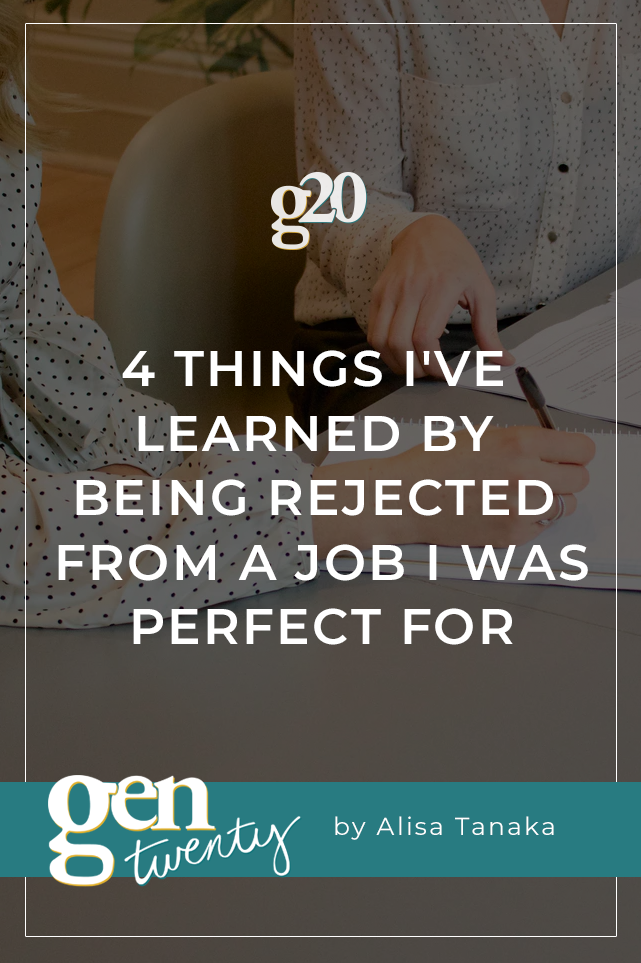
I recently applied for a job that I thought I was absolutely perfect for. The values of the organization aligned with my own, I had the transferable skills and background that was necessary, and, best of all, the job built on skills that I already had while allowing me to learn new skills and grow in the role.
I didn’t get the job.
Research shows that men apply for a job if they meet 60% of the job requirements, whereas women apply for the job if they meet 100% of those requirements. In my view, this was one of those jobs. I was certainly disappointed to not receive an offer in the end.
This was not new—I am not a new graduate and have been rejected from jobs before. However, this was an experience that taught me a lot about the job hunting process.
4 Things I’ve Learned By Being Rejected From A Job That I Thought I Was Perfect For
It’s Not Always About Your Skills or Experience
You know that feeling that you get when you read a job description, and think, “This would be perfect,” or go down the list of desired qualifications, and think, “Check, check, check.”?
Yeah, that was me.
When I was informed that I had been passed over, I was disappointed, as to be expected. However, in the words of a very good friend of mine, during a job interview, the company is also assessing you to ensure that you are a good fit for the existing culture of the company.
Unfortunately, when it comes to job hunting, it isn’t always about your skills and your experience. It is difficult to say exactly what it is that a particular employer is looking for. Your rejection could be due to any combination of factors, some of which you may have absolutely no control over.
Keeping the Lines of Communication Open Is Important
While it is important to accept decisions with grace and professionalism, keeping the lines of communication is important. These contacts that you make during the interview are still contacts, even if they are not your employer.
The CEO of the organization reached out to me directly to inform me that I had been passed over. Knowing that the CEO had reached out to me directly out of an applicant pool in the triple digits was something that gave me pause. I kept communication courteous and cordial. Yes, I was disappointed with the final decision, but that didn’t mean that I couldn’t remain professional and courteous.
This means thanking anyone and everyone who was involved in the process, from those who made the introduction to any potential contacts and supervisors who wrote recommendations on your behalf.
Nurturing your network by doing little things like following up with your contacts puts you in good stead with others.
You Never Know Where Your Next Opportunity Is Going To Come From
When you put in a lot of time and effort into a job application that you are passionate about, it can be difficult to move forward when you discover that you were not selected. It is important to care for yourself; it is fine to take the time to feel the disappointment. However, with that said, it is equally important to move forward and look for additional jobs or contacts, even if you spend only a few minutes on LinkedIn per day or take only 1 Zoom meeting a week.
I spoke with the new program coordinator and CEO of the organization a few days after I had received the rejection. After an in-depth discussion, they offered me a remote fellowship.
If I am honest, I didn’t expect this opportunity to come my way—I was prepared to continue working on my job search. Having said that, I was happy to have this opportunity in order to further my career.
Doing something for your career, even just one meeting per week with a potential contact, can do wonders because you never know where your next opportunity is going to come from.
Just Because You Got Rejected From The Job Doesn’t Mean That People Don’t See Your Value
I was lucky; the CEO reached out to me with a lengthy email soon after their decision was finalized. I was touched. It was clear that they had read through my application thoroughly and had recognized what I had to offer.
While I am aware that not every executive reaches out to an applicant personally amid a pool of applicants that was in the triple digits, I will say that that choice on his part was something that greatly enhanced my opinion of this particular organization. It told me a lot about the culture of that organization and what the CEO valued.
You may not get a personal email from a CEO, but it doesn’t mean that the organization doesn’t see your value. Even if you are not selected for the onboarding process, there is an organization out there that will see value in the skill sets that you bring to the table! It’s a question of finding an organization that is a mutual fit.
The job hunting process is an emotional roller coaster. It is easy to attach your sense of self-worth to the job you are doing, particularly within the current circumstances. Rejection stings, there is no doubt about that. However, making a conscious effort to look for the positive within the job search will carry you through.
